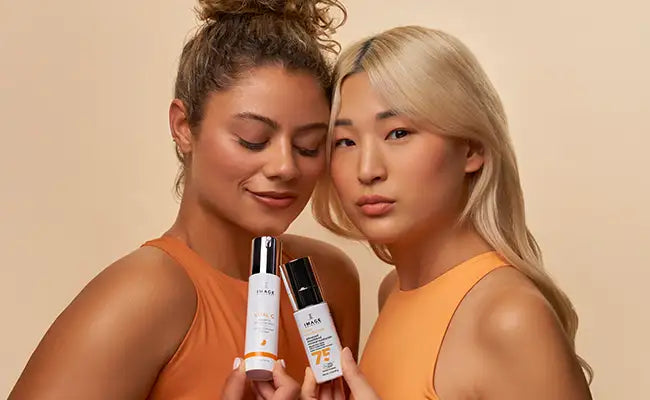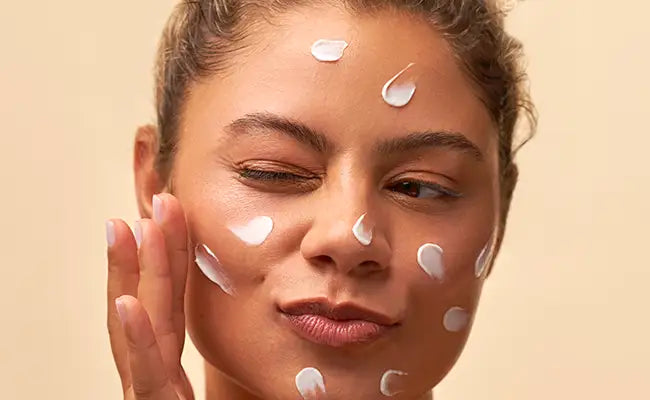When it comes to our skin-tone differences, it comes down to melanin. In skin, melanin is what determines skin tone, whether it’s pale or the darkest beautiful black.
Individuals with dark skin share some unique characteristics with each other that they may not share with paler-skinned friends. But when it comes to how you maintain your skin each day, does darker skin need different skincare? The answer is yes! Having the right skincare products for darker skin tones can make a world of difference in how well your skin looks as you age.
What is Melanin?
Melanin originates from tyrosine, which is an amino acid that also plays a role in the development and production of epinephrine and dopamine. Melanin specifically is responsible for determining the color of your skin, eyes, and hair by producing different levels of pigmentation throughout these areas of your body.
Melanin also plays a large role in your overall skin’s health. It can also affect how your hair, pupils, and irises develop in color. Additionally, your body produces three different types of melanin including eumelanin, pheomelanin, and neuromelanin, with each one playing an important role in a different area of your body.
Individuals with more melanin in their body are somewhat more protected from harmful UV rays, while fair-skinned or pale-skinned individuals will tan and sunburn much easier. However, increased melanin production in your body is not enough on its own to prevent sun damage to your skin. Instead, make sure you wear a proper SPF sunscreen, such as our DAILY PREVENTION ultra defense moisturizer! This silky-smooth formula offers SPF 50 broad-spectrum UVA and UVB protection and leaves a sheer finish that blends seamlessly with dark skin.

What are the Benefits of Melanin?
As mentioned above, one of the biggest benefits of melanated skin is protection from both UVA and UVB rays. Additional studies have found darker skinned individuals with a higher melanin production to also be more protected from UVC and blue light damage as well.
Melanin can also be responsible for protecting your skin against reactive oxygen species, or ROS, which is a natural byproduct of various cell processes. As these ROS build up in your cells, they can lead to a wide range of skin and overall health concerns including signs of premature aging, and potential risks for cancers or diabetes.
Common Skin Conditions That Impact Dark Skin
Hyperpigmentation
As the medically accepted term for dark spots on melanin-rich skin, hyperpigmentation can form after a minor injury has been done to the skin. This can be from acne blemishes, small cuts, or seasonal insect bites.
Numerous ingredients across various skincare products can be used to reduce hyperpigmentation. These ingredients can include glycolic acid and vitamin C.
When it comes to reducing hyperpigmentation on dark skin, we recommend our ILUMA® intense brightening serum. It contains a botanical brightening blend that has rumex occidentalis and bearberry extracts to promote even skin tone throughout. You’ll also find a potent form of vitamin C to help brighten and balance dull or darkened skin, along with a green tea extract antioxidant.

Excess Oils and Acne
Dark-skinned individuals also produce a higher number of natural oils or sebum, which can be a great way to keep skin moisturized and wrinkle-free, but also brings a higher risk of acne throughout adulthood.
Maintaining a proper acne treatment on dark skin is important, as acne scars can lead to hyperpigmentation and dark spots. Try skincare products that specifically target acne blemishes with ingredients like salicylic acid, as well as products for oily skin and oil control.
Sensitive Skin
It’s not uncommon for people of color to have sensitive skin as well. Melanated skin can show more allergic reactions to products with artificial dyes, fragrances or perfumes, and chemicals than pale skin.
Using products that irritate your skin can lead to a whole range of additional problems including inflammation and redness, dark marks and hyperpigmentation, and more. If you suffer from redness and sensitivity, check out our collection of skincare that puts an emphasis on being gentle while nourishing skin.
Dark Marks
Similar to hyperpigmentation, dark marks are commonly caused by a skin condition known as melasma. While there can be many factors that cause melasma, the most common causes are hormonal imbalances in women that are pregnant or using birth control.
Our large collection of skincare specifically for dealing with dark spots and uneven skin tone allows you to choose the best formula for your unique skin and concerns. These products normally contain strong or multiple antioxidants in order to brighten and balance your skin tone.
Signs of Aging
A huge plus: signs of aging will appear in dark-skinned individuals later than it will in pale-skinned individuals! When the visible signs of aging inevitably does occur, melanated skin tends to age quite gracefully.
If you have darker skin, you’ll be taking the same skincare steps and precautions as any other skin tone, but as always, equipping yourself with knowledge about how your unique and beautiful skin works will help you make more informed decisions.
Now slather on the SPF and the serums and creams, then bare your gorgeous skin to the world!
Sources:
https://www.ncbi.nlm.nih.gov/pmc/articles/PMC4756870/
https://www.ncbi.nlm.nih.gov/pmc/articles/PMC2671032/
https://www.healthline.com/health-news/melanin-protects-us-from-and-can-cause-skin-cancer-021915
https://journals.physiology.org/doi/full/10.1152/physrev.00044.2003
https://www.medicalnewstoday.com/articles/melanin








